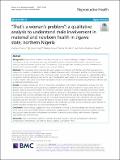| dc.contributor.author | Sharma, Vandana | |
| dc.contributor.author | Leight, Jessica E. (Jessica Ellen) | |
| dc.contributor.author | Giroux, Nadège | |
| dc.contributor.author | AbdulAziz, Fatima | |
| dc.contributor.author | Nyqvist, Martina B | |
| dc.date.accessioned | 2020-07-17T19:41:58Z | |
| dc.date.available | 2020-07-17T19:41:58Z | |
| dc.date.issued | 2019-09 | |
| dc.identifier.issn | 1742-4755 | |
| dc.identifier.uri | https://hdl.handle.net/1721.1/126248 | |
| dc.description.abstract | BACKGROUND: Maternal and newborn mortality continue to be major challenges in Nigeria. While greater participation of men in maternal and newborn health has been associated with positive outcomes in many settings, male involvement remains low. The objective of this analysis was to investigate male involvement in maternal and newborn health in Jigawa state, northern Nigeria. METHODS: This qualitative study included 40 event narratives conducted with families who had experienced a maternal or newborn complication or death, in-depth interviews with 10 husbands and four community leaders, and four focus group discussions with community health workers. The interviews focused on understanding illness recognition and care seeking as well as the role of husbands at each stage on the continuum of maternal and newborn health. Data were transcribed, translated to English, and coded and analyzed using Dedoose software and a codebook developed a priori. RESULTS: This paper reports low levels of knowledge of obstetric and newborn complications among men and limited male involvement during pregnancy, childbirth and the post-partum period in Jigawa state. Men are key decision-makers around the location of the delivery and other decisions linked to maternal and newborn health, and they provide crucial resources including nutritious foods and transportation. However, they generally do not accompany their wives to antenatal visits, are rarely present for deliveries, and do not make decisions about complications arising during delivery and the immediate post-partum period. These gendered roles are deeply ingrained, and men are often ridiculed for stepping outside of them. Additional barriers for male involvement include minimal engagement with health programs and challenges at health facilities including a poor attitude of health providers towards men and accompanying family members. CONCLUSION: These findings suggest that male involvement is limited by low knowledge and barriers related to social norms and within health systems. Interventions engaging men in maternal and newborn health must take into account these obstacles while protecting women’s autonomy and avoiding reinforcement of gender inequitable roles and behaviors. | en_US |
| dc.description.sponsorship | United States Agency for International Development (Cooperative Agreement GHS-A-00-09-00015-00) | en_US |
| dc.publisher | BioMed Central | en_US |
| dc.relation.isversionof | 10.1186/s12978-019-0808-4 | en_US |
| dc.rights | Creative Commons Attribution | en_US |
| dc.rights.uri | https://creativecommons.org/licenses/by/4.0/ | en_US |
| dc.source | BioMed Central | en_US |
| dc.title | 'That’s a woman’s problem': a qualitative analysis to understand male involvement in maternal and newborn health in Jigawa state, northern Nigeria | en_US |
| dc.type | Article | en_US |
| dc.identifier.citation | Sharma, Vandana et al. "'That’s a woman’s problem': a qualitative analysis to understand male involvement in maternal and newborn health in Jigawa state, northern Nigeria." Reproductive Health 16 (Sept. 2019): no. 143 doi 10.1186/s12978-019-0808-4 ©2019 Author(s) | en_US |
| dc.contributor.department | Abdul Latif Jameel Poverty Action Lab (Massachusetts Institute of Technology) | en_US |
| dc.relation.journal | Reproductive Health | en_US |
| dc.eprint.version | Final published version | en_US |
| dc.type.uri | http://purl.org/eprint/type/JournalArticle | en_US |
| eprint.status | http://purl.org/eprint/status/PeerReviewed | en_US |
| dc.date.updated | 2020-06-26T11:04:28Z | |
| dc.language.rfc3066 | en | |
| dc.rights.holder | The Author(s). | |
| dspace.date.submission | 2020-06-26T11:04:28Z | |
| mit.journal.volume | 16 | en_US |
| mit.license | PUBLISHER_CC | |
| mit.metadata.status | Complete | |
